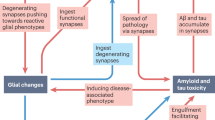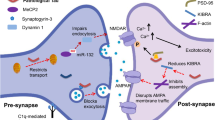Abstract.
Among the different types of cognitive impairment that appear with increasing age, Alzheimer’s disease (AD) is rated as the most frequent. Despite intensive research, key questions concerning AD aetiology remain elusive, but it appears that many biochemical events crucial for neuronal communication and synaptic plasticity fail during the course of the disease. The aim of this review is therefore to provide an overview of intracellular cascades involved in AD pathology. For almost all factors, it is a matter of controversy whether their contribution should be considered to be cause or effect. However, intracellular signalling may be crucial — as it is in learning and memory mechanisms — and malfunction of biochemical pathways may be a common denominator in neurodegenerative processes, thus providing new venues for treatment and therapeutic strategies.
Similar content being viewed by others
Author information
Authors and Affiliations
Additional information
Rights and permissions
About this article
Cite this article
von Linstow Roloff, E., Platt, B. Biochemical dysfunction and memory loss: the case of Alzheimer's dementia. CMLS, Cell. Mol. Life Sci. 55, 601–616 (1999). https://doi.org/10.1007/s000180050318
Issue Date:
DOI: https://doi.org/10.1007/s000180050318




